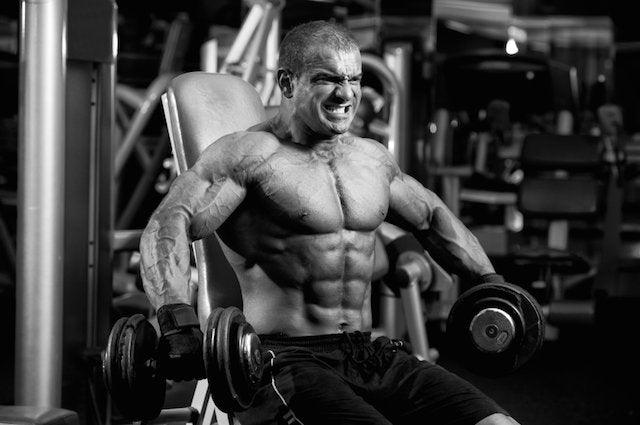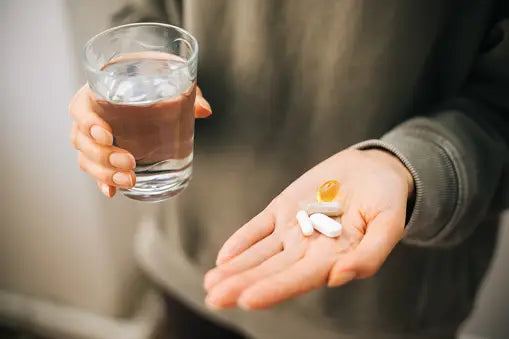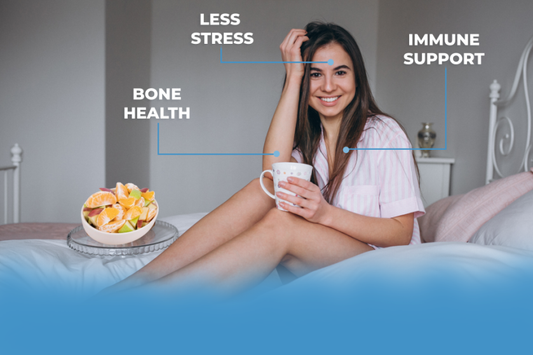

Sleep, Grow, Repeat for More Muscle
Table of Contents
Sleep and Muscle Growth: Get the Facts
by: Robbie Durand
Sleep is one of the most neglected aspects of health for most athletes. Not getting a good night’s sleep can not only affect performance but it can also impact your gains in the gym. Sleep deprivation is a stressor which affects many body systems. Sleep deprivation has been found to result in increased blood pressure via sympathetic activation and, consequently, an increased risk of cardiovascular disease.
This physiological disturbance could be attributed to increased levels of stress hormones (i.e. catecholamines and cortisol), arising from an increased sympathetic activity. Among the hormonal changes with loss of sleep, there is an increase in cortisol, and a reduction in testosterone and Insulin-like Growth Factor 1, favoring the establishment of a highly catabolic environment.
Consequently, sleep loss decreases protein synthesis pathways and increases the activity of protein degradation pathways, supporting the loss of muscle mass and thus hindering muscle recovery after damage induced by exercise, injuries and certain conditions associated with muscle atrophy.
Studies in volunteers who slept short versus long hours show that sleep reduction was accompanied by increased hunger, higher circulating concentrations of the appetite-stimulating hormone, ghrelin, and reduced levels of the weight loss hormone, leptin. To determine whether sleep restriction suppresses the effects of a reduced-calorie diet on excess adiposity, researchers had subjects follow a similar diet but differed the duration of sleep. One group slept 8½ hours per night while the other group slept 5½ hours. Sleep restriction decreased the fraction of weight loss of fat by 55% and increased the loss of fat-free body mass by 60%.
In summary, dieting adults getting 5½ hours of sleep produced a catabolic state characterized by reduced loss of body fat and increased the loss of fat-free body mass, accompanied by increased hunger and changes in energy expenditure and the neuroendocrine control of substrate utilization. The findings should make bodybuilders aware that cutting back on sleep while dieting can not only cause a catabolic state but can also hinder fat loss gains.
Cyclo Rem
Maximize your recovery with Cyclo Rem, your nighttime recovery formula to support muscle recovery and a restful night’s sleep.
Sleep Loss Increases Muscle Injury Following Exercise
In the latest Journal of Sports Medicine and Physical Fitness reported even more shocking news as to the severity of a single night of sleep loss. This month’s research paper titled, “One night of partial sleep deprivation increased biomarkers of muscle and cardiac injuries during acute intermittent exercise” is raising the eyebrows of researchers and athletes alike on how even a single night of sleep loss can damage a lifter’s gains.
Researchers evaluated the effect of two types of partial sleep deprivation on biomarkers of muscle and cardiac injuries in response to acute intermittent exercise in professional athletes. Ten healthy male Taekwondo athletes were asked to perform the intense exercise in three conditions, allowing a 36 h recovery period in between:
i) following a full night of regular sleep known as a reference sleep night;
ii) ii) following partial sleep deprivation at the beginning of the night, and
iii) iii) following partial sleep deprivation at the end of the night.
 At the end of the study, one night of partial sleep deprivation had no effect on heart rate during exercise. More concerning was that all biomarkers related to muscle and cardiac injuries were altered by exercise. Likewise, compared to restful, night’s sleep, partial sleep deprivation increased markers of muscle damage but increasing creatine phosphokinase and myoglobin levels in response to exercise in the evening of the following day. The study indicates that partial sleep deprivation increases the resting markers of muscle damage (i.e. CRP and MYO levels) and that the two types of partial sleep deprivation increase the CPK and MYO levels in response to acute intermittent exercise, in the evening of the following day. However, no rise of the physiological responses has been observed after the two types of partial sleep deprivation at rest and in response to the exercise. So if you’re not sleeping well, then you are in a constant state of catabolism.
At the end of the study, one night of partial sleep deprivation had no effect on heart rate during exercise. More concerning was that all biomarkers related to muscle and cardiac injuries were altered by exercise. Likewise, compared to restful, night’s sleep, partial sleep deprivation increased markers of muscle damage but increasing creatine phosphokinase and myoglobin levels in response to exercise in the evening of the following day. The study indicates that partial sleep deprivation increases the resting markers of muscle damage (i.e. CRP and MYO levels) and that the two types of partial sleep deprivation increase the CPK and MYO levels in response to acute intermittent exercise, in the evening of the following day. However, no rise of the physiological responses has been observed after the two types of partial sleep deprivation at rest and in response to the exercise. So if you’re not sleeping well, then you are in a constant state of catabolism.
Cyclo Rem
Maximize your recovery with Cyclo Rem, your nighttime recovery formula to support muscle recovery and a restful night’s sleep.
 |
GABA Counteracts Effects of Caffeine
GABA is an important inhibitory neurotransmitter in the central nervous system; it’s involved in normal sleep physiology. GABA can relieve anxiety, reduce psychological stress, and induce relaxation by increasing total and parasympathetic nerve activities. GABA may also increase the levels of melatonin and serotonin in the brain adding to its sleep-promoting properties. GABA is most often used as a sleep aid to enhance REM sleep and enhance night time recuperation. Many of the traditional sleep pharmaceutical drugs work on interacting with the GABA receptor for sleep.
GABA may be the perfect night time sleep supplement for those who exercise at night because it can reduce the stimulatory effects of caffeine which can reduce nighttime sleep. For example, researchers wanted to examine whether GABA could ameliorate caffeine-induced sleep disturbance in mice. They gave mice a supraphysiological dose of caffeine (10 mg/kg) which delayed sleep onset and reduced sleep duration in mice. The mice were also given GABA to see if the GABA would counteract the sleep disturbances caused by caffeine. At the end of the study, GABA was able to counteract caffeine-induced sleep disturbance and decreased sleep reduction in mice. The results of the study suggest increased sleep duration from GABA administration, which remarkably neutralized the sleep-disrupting effects of caffeine.
GABA acts to counteract the adverse effects of the adenosine receptor, as caffeine to block the actions of caffeine whereas GABA works to increase the actions of GABA. This study reports that positive benefits of GABA are counteracting the stimulating effects of caffeine which may be useful for bodybuilders who want the best of both worlds for having a strong pre-workout and also quality sleep, then add some GABA at night for post-exercise recovery.

The latest study published in the Journal of Food Science and Biotechnology titled, “Effect of oral γ-aminobutyric acid (GABA) administration on sleep and its absorption in humans” sheds interest on the benefits of taking GABA before bed. Subject’s who were suspected to have small sleep disorders participated in the study. Participants were given 100 mL of water with 200 mg of GABA 30 minutes before going to bed everyday for a week. At the end of the study, GABA exhibited its effect during the early stage of sleep. Besides shortening the time it took for people to get to sleep, GABA significantly increased total non-REM sleep time by 2.2%. This is favorable because non-REM sleep is a deeper sleep and is thought to rest both the brain and the body.
If you’re looking to enhance your sleep, you may want to consider a high-quality sleep product like CYCLO-REM before bed to counteract caffeine induced sleeplessness.
Cyclo Rem
Maximize your recovery with Cyclo Rem, your nighttime recovery formula to support muscle recovery and a restful night’s sleep.
| Mabunga DFN, Gonzales ELT, Kim HJ, Choung SY. Treatment of GABA from Fermented Rice Germ Ameliorates Caffeine-Induced Sleep Disturbance in Mice. Biomolecules & Therapeutics. 2015;23(3):268-274. doi:10.4062/biomolther.2015.022. |
Shirlow M, Mathers C. A study of caffeine consumption and symptoms: indigestion, palpitations, tremor, headache and insomnia. Int J Epidermiol. 1985;14:239–248.
Landolt HP, Rétey JV, Tonz K, Gottselig JM, Khatami R, Buckelmuller I, Achermann P. Caffeine attenuates waking and sleep electroencephalographic markers of sleep homeostasis in humans. Neuropsychopharmacology. 2004;29:1933–1939.
Mitchell DC, Knight CA, Hockenberry J, Teplansky R, Hartman TJ. Beverage caffeine intakes in the US. Food Chem Toxicol. 2014;63:136–142. doi: 10.1016/j.fct.2013.10.042.
Turek FW, Losee-Olson S. A benzodiazepine used in the treatment of insomnia phase-shifts the mammalian circadian clock. Nature. 1986;321:167–186.
Mathias S, Wetter TC, Steiger A, Lancel M. The GABA uptake inhibitor tiagabine promotes slow wave sleep in normal elderly subjects. Neurobiol Aging. 2001;22:247–253.
Arbi Mejri M, Yousfi N, Hammouda O, Tayech A, Ben Rayana MC, Driss T,
Chaouachi A, Souissi N. One night of partial sleep deprivation increased
biomarkers of muscle and cardiac injuries during acute intermittent exercise. J Sports Med Phys Fitness. 2016 Feb 11.
Lusardi P, Zoppi A, Preti P, Pesce RM, Piazza E, Fogari R. 1999. Effects of insufficient sleep on blood pressure in hypertensive patients: a 24-h study. Am J Hypertens 12: 63–68.
Irwin M, Thompson J, Miller C, Gillin JC, Ziegler M. Effects of sleep and sleep deprivation on catecholamine and interleukin-2 levels in humans: clinical implications. 1999. J Clin Endocrinol Metab. 84: 1979–1985.

















